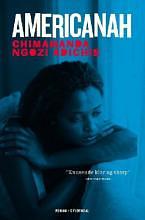You need to sign in or sign up before continuing.
Take a photo of a barcode or cover
emotional
funny
mysterious
sad
tense
Americanah, by Chimamanda Ngozi Adichie, is very accessible account of a Nigerian woman who goes to America and then returns to Nigeria. Part love story, part searing indictment of American views on race, Adichie paints a subtle picture of an outsider's perspective on American culture. Along the way she mocks academic intellectuals with their need for everyone have a subtextual meaning suitable for analysis just as much as their opposites who accept everyone face value. Highly recommended.
Loved this book, the style is awesome, And I could relate to many aspects of it, from the comments she gets from americans to her hair routine. Simple novel yet beautiful and relateable
I truly enjoyed every page of this book. It's beautifully written, provocative, and one that I know I will think about for a long time moving forward. It made me rethink and reconsider the immigrant experience, to better understand and empathize with the motivations and struggles that so many people face. What an excellent and worthwhile read, I look forward to reading more of her books.
This book is as important as it is readable.
A vibrant, richly characterised love story, into which social commentary and poignant insights into race and cultural identity are seamlessly woven.
It is funny, sad, thought-provoking, anger-inducing and completely gripping.
I will be reading more Adichie, and I think you should too.
A vibrant, richly characterised love story, into which social commentary and poignant insights into race and cultural identity are seamlessly woven.
It is funny, sad, thought-provoking, anger-inducing and completely gripping.
I will be reading more Adichie, and I think you should too.
I absolutely loved Adichie's Half of a Yellow Sun from a few years ago, so I didn't need too much convincing to add her latest book to my to-read list. Whereas her last novel told the story of 1960s Nigeria and the Biafran War, Americanah spans cultures and worlds, capturing the essence of having a flexible sense of home and identify. The two main characters in Americanah are Nigerians who deal with the harsh realities of migrating to the US and England, as well as the struggles inherent in returning home and finding themselves changed. Adichie uses their love story to bluntly confront issues of race, privilege, xenophobia, immigration, and cultural identity. I enjoyed the story and found myself pulled into the book, but I have to admit that Half of a Yellow Sun wowed me more. If you haven't read anything by Adichie yet, I would recommend starting there first for a stunning story rooted in Nigerian history, and then making your way to Americanah for a more modern take on what it means to be Nigerian.
emotional
slow-paced
Plot or Character Driven:
Character
Strong character development:
Complicated
Loveable characters:
Complicated
Diverse cast of characters:
Yes
Flaws of characters a main focus:
Yes
adventurous
emotional
inspiring
reflective
sad
medium-paced
Plot or Character Driven:
Character
The concept was interesting - the effect of dislocation on a person - Ifemelu is untimely, though not unwillingly ripped from her life in Nigeria at the end of her secondary schooling, to take up a scholarship in America. The novel investigates the hardships suffered by International students from developing countries, who are not allowed to work to supplement their lives whilst studying, and so are forced into the working poor underclass of illegals which so benefit the economies of western countries, especially their wealthy middle classes.
Ifemelu encounters racism and depression, and loses the love of her life when he is unable to follow her from Nigeria, finally losing contact when she is forced by desperate circumstances into an exploitative sexual job for a corrupt tennis coach; she is too ashamed to get back in contact with Obinze, her Nigerian boyfriend, and they drift apart. Ifemelu ends up living in the US for 13 years, and the book tediously follows her relationships, which are all diluted by her inability to commit, as her heart is still with Obinze, who has since remarried and become wealthy in Nigeria. The story contains plenty of interesting observations, cloaked in Ifemelu's Blog posts and conversations with fellow students, about racism and politics, and comparisons between expat Nigerians and those who have not left the country, on their return.
The bottom line for me is that I found the novel too slow moving. The racial observations in Ifemelu's blog were pretty predictable, the failure of her relationships repetitive, and the story quite lacking in action. Perhaps I've been reading too many Young Adult novels, but this one didn't do much for me. Well intentioned and quite well written, I just wasn't inspired.
Ifemelu encounters racism and depression, and loses the love of her life when he is unable to follow her from Nigeria, finally losing contact when she is forced by desperate circumstances into an exploitative sexual job for a corrupt tennis coach; she is too ashamed to get back in contact with Obinze, her Nigerian boyfriend, and they drift apart. Ifemelu ends up living in the US for 13 years, and the book tediously follows her relationships, which are all diluted by her inability to commit, as her heart is still with Obinze, who has since remarried and become wealthy in Nigeria. The story contains plenty of interesting observations, cloaked in Ifemelu's Blog posts and conversations with fellow students, about racism and politics, and comparisons between expat Nigerians and those who have not left the country, on their return.
The bottom line for me is that I found the novel too slow moving. The racial observations in Ifemelu's blog were pretty predictable, the failure of her relationships repetitive, and the story quite lacking in action. Perhaps I've been reading too many Young Adult novels, but this one didn't do much for me. Well intentioned and quite well written, I just wasn't inspired.




